June 18, 2025 | 10:46 GMT +7
June 18, 2025 | 10:46 GMT +7
Hotline: 0913.378.918
June 18, 2025 | 10:46 GMT +7
Hotline: 0913.378.918
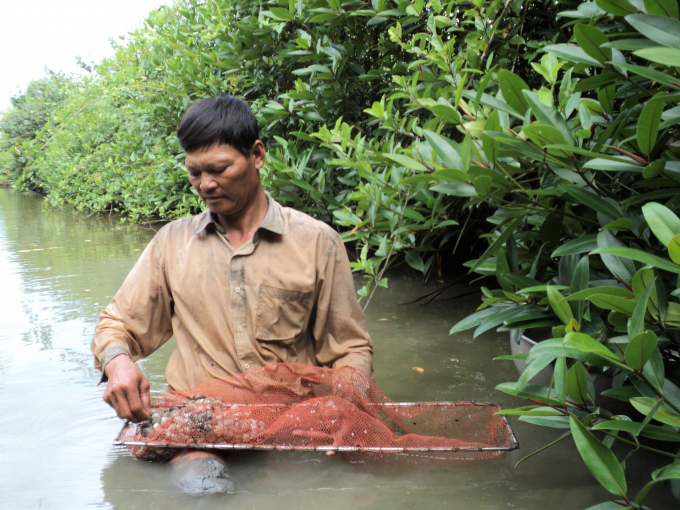
Vam Ray villagers earn more money by growing vegetables and aquaculture thanks to the restored coastal protective forest. Photo: Trung Chanh.
The Mekong Delta province of Kien Giang has planted over 600 ha of coastal protective forest as a green shield to minimise threats from the nature and protect the people’s lives over the past 10 years and continued grow an addition of nearly 3,000 ha of coastal protective forest until 2022.
The move came after a survey, conducted by the provincial Agriculture and Rural Development Department, showed that coastal erosion has occurred continuously in the province over the decade.
As calculations, there has been still 12 points of coastal erosion with a total length of more than 82 km, mainly on the coastal routes of An Bien - An Minh, Hon Dat - Kiên Lương and in some local islands so far.
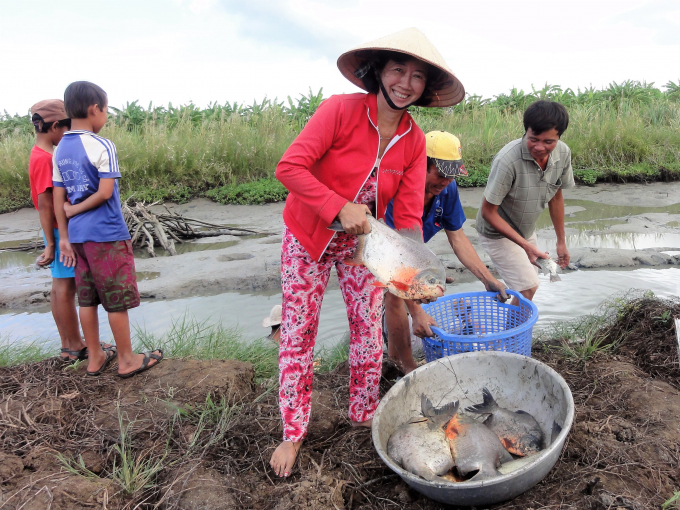
People in An Bien - An Minh areas grow aquaculture in the coastal protective forest canopy, ensuring sustainable livelihoods and protecting the forest. Photo: Trung Chanh.
Therefore, the province has made efforts to re-plant the coastal protective forest, in parallel with building breakwaters to prevent landslides and create sedimentation to help the forest in growing.
Data from the agriculture department said nearly 3 ha of mangrove forest had been re-planted during 2009-2011, forming a strong protective belt in front of the sea in Vam Ray Village, Hon Đat District, following the Integrated Coastal Management Programme, funded by the German Agency for International Co-operation (GIZ).
Nguyen Van Hung, director of the provincial Forest Management Board said when afforestation was successful, creating a green shield, threats from nature had been minimised.
It was much more convenient to re-build livelihoods of local people. In addition to livelihood restoration, people's awareness of environment and climate-change adaptation was also improved, he said.
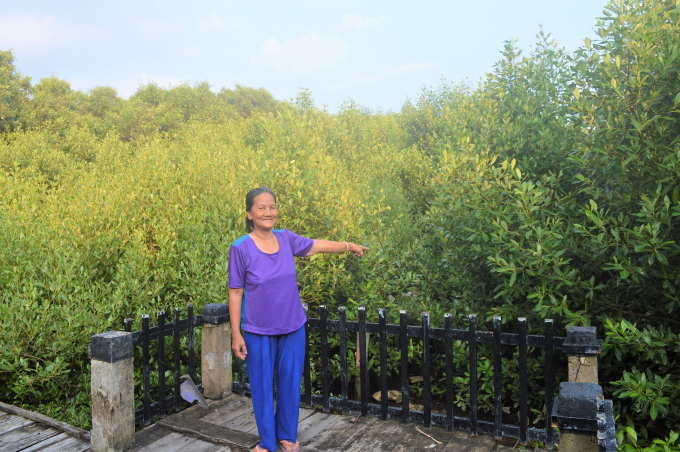
Nguyen Thi Thu stands in front of a mangrove forest – a green shield protecting sea dykes and creating livelihoods for people living in Vam Ray Village. Photo: Trung Chanh.
Hoang Van Tuan, deputy director of the agriculture department said the province already grew 604 ha of coastal protective forest between 2019 and now.
The varieties that were selected for growing the coastal protection forests were typical species with high tolerance such as mangrove, he said.
After the trees had grown into forests, they would be handed over to the local forest management board and forest rangers to take care, he said.
Recently, the project "Combining coastal protection and mangrove rehabilitation in Kien Giang and Ca Mau provinces" has been kicked off by the Ministry of Agriculture and Rural Development.
The project’s implementation period is between 2019 to 2022 with a total fund of EUR24 million (USD28 million). Of which, the preferential loan from the German Government is EUR18 million and the counterpart fund of the Vietnamese Government is EUR6 million.
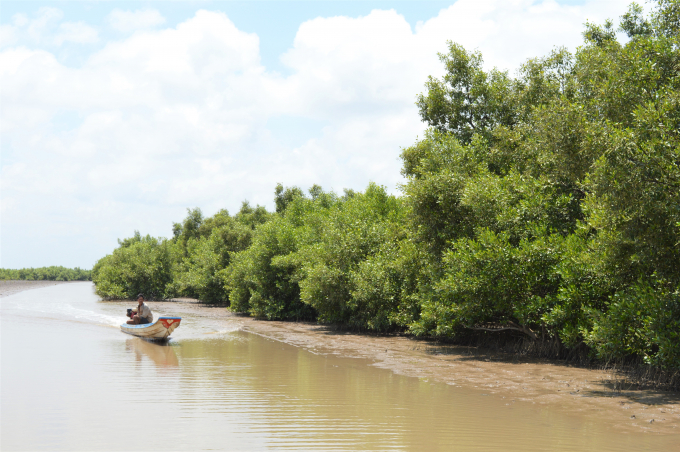
Kiên Giang Province has made efforts to restore the coastal protective forest to effectively protect the dyke system and people's livelihoods. Photo: Trung Chanh.
The project is believed to be one of the foundations for the locality to implement the Resolution No 120 of the Government on sustainable development of the Mekong Delta, adapting to climate change.
Author: Trung Chanh. Translated by Thu Hang. Edited by Duc Huy.
![Turning wind and rain into action: [8] Real-time salinity detection and early warning technology](https://t.ex-cdn.com/nongnghiepmoitruong.vn/608w/files/news/2025/06/17/z6704423696987_15fd32ffc26d590d204d520c9dac6786-nongnghiep-151127.jpg)
(VAN) Thanks to the integration of modern hydrological-hydraulic models, remote sensing technologies, and artificial intelligence, the accuracy of hydrological forecasting has significantly improved.
![Turning wind and rain into action: [7] Early disaster warnings help marine farmers minimize losses](https://t.ex-cdn.com/nongnghiepmoitruong.vn/608w/files/news/2025/06/17/z6704423696987_15fd32ffc26d590d204d520c9dac6786-nongnghiep-142942.jpg)
(VAN) In recent years, thanks to early disaster warnings and forecasting, marine farmers in Khanh Hoa province have been able to reduce risks and losses, thereby improving production efficiency.
![Turning wind and rain into action: [6] ‘Four on-the-spot’ disaster management software](https://t.ex-cdn.com/nongnghiepmoitruong.vn/608w/files/news/2025/06/17/e5a48259d6a262fc3bb3-nongnghiep-183800.jpg)
(VAN) By simply activating the scenario on the disaster management software, the relevant authorities immediately know how many households need to be evacuated, where to evacuate them to, and by what means of transportation…
![Turning wind and rain into action: [5] Hue applies modern technology in disaster forecasting](https://t.ex-cdn.com/nongnghiepmoitruong.vn/608w/files/news/2025/06/17/z6704423696987_15fd32ffc26d590d204d520c9dac6786-nongnghiep-093938.jpg)
(VAN) In Hue city, modern technology has recently been applied in meteorological and hydrological forecasting and warning, helping to reduce the damage caused by natural disasters.

(VAN) A cutting-edge farming technique being implemented on an experimental ranch in Arizona's Sonoran Desert has already saved a billion gallons of water over five years, according to Civil Eats.

(VAN) Poultry and pig production and the environment can be boosted through enhanced water technology, according to new research.
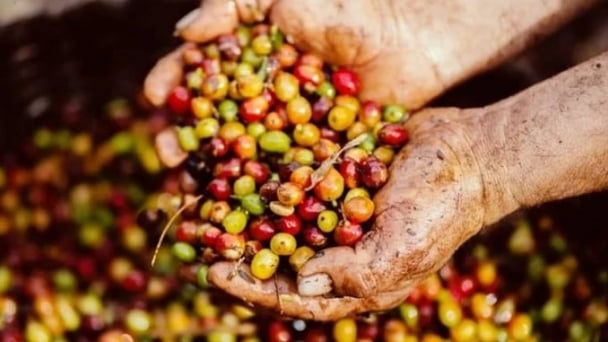
(VAN) Coffee prices on June 16, 2025 are unchanged. In Vietnam, local trading prices are holding steady, ranging around VND 112,000 – VND 112,500/kg.